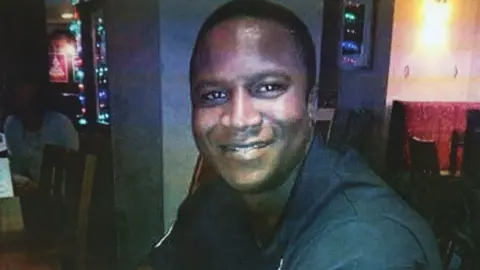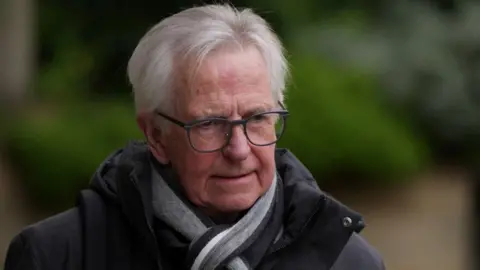Chair of Sheku Bayoh inquiry to consider stepping down
 Bayoh family
Bayoh familyThe chairperson of the Sheku Bayoh inquiry is to consider whether he should step down after the Scottish Police Federation (SPF) questioned his impartiality.
The organisation, which represents rank and file officers, has raised concerns about Lord Bracadale's meetings with the family of Mr Bayoh.
The father-of-two was 31 when he died in May 2015 after being restrained by six police officers in Kirkcaldy, Fife.
Former High Court judge Lord Bracadale, who was appointed five years ago, will seek the opinion of all the parties represented at the inquiry at a hearing in June, before deciding whether to carry on or step aside.
It he stays, the federation could challenge his decision through a judicial review.
But if Lord Bracadale goes, it will result in a significant delay to the inquiry issuing its findings.
Aamer Anwar, the Bayoh family's solicitor, described the SPF's move as a "desperate and pathetic attempt to derail the inquiry".
And he said if Lord Bracadale does step down it would delay proceedings by "years".
The SPF later confirmed it had launched a petition for a judicial review as it said none of the core participants had been notified about the meetings.
It also added the substance of the meetings had not been disclosed.
 PA Media
PA MediaA spokesperson for the inquiry said: "The Scottish Police Federation has raised concerns about Lord Bracadale meeting with the families of Mr Bayoh.
"Loss of confidence by a core participant in the fairness of the conduct and procedure of the inquiry by Lord Bracadale is a matter of concern.
"The Inquiry intends to hold a public hearing in June on the fairness of the conduct and procedure adopted by Lord Bracadale in meeting the families. Submissions are invited from all core participants."
Since his appointment in 2020, Lord Bracadale has held 122 days of oral hearings, examining what happened on the day of Mr Bayoh's death, the way the incident was investigated and handled by the authorities and whether race was a factor.
The uncertainty over his position comes with the inquiry's finishing line in sight.
It has completed the process of gathering evidence and was due to hear closing submissions before Lord Bracadale begins the task of reaching his conclusions.
'Widely respected'
Mr Anwar told BBC Scotland News it was not unusual for the chairperson of a public inquiry to meet victims' families.
He added: "Lord Bracadale is a man who is widely respected across the legal profession.
"He has given 50 years of his life to public service, without blemish.
"This attempt to attack his integrity and impartiality, as far as the Bayoh family is concerned, is beneath contempt."
But SPF chairperson David Kennedy said: "These unusual developments have left many core participants feeling that the process no longer appears transparent and open, with all core participants being treated equally.
"We have lost confidence in the inquiry and regrettably, we have been compelled to indicate that we consider it necessary to petition for judicial review."
Mr Kennedy added he would listen to what Lord Bracadale had to say at the hearing in June but imagined it would be necessary to proceed with the action.
'Impartiality and transparency'
In March Sadif Ashraf, the solicitor to the inquiry, wrote to all the participants after concerns were raised relating to Lord Bracadale's meetings with Mr Bayoh's family.
The letter said: "The engagement of the families with the inquiry is crucial to the effectiveness of the inquiry in fulfilling its terms of reference.
"If the inquiry failed to obtain and retain the confidence of the families its effectiveness would be prejudiced."
It added there was a "real prospect" the family would not engage with the inquiry as they had lost confidence in the state institutions they had dealings with since 2015.
Ms Ashraf named Police Scotland, the Police Investigations and Review Commissioner and the Crown Office.
She also said Lord Bracadale wanted to "keep the families at the heart of the inquiry" and that it was "reasonable and appropriate" to meet them from time to time.
The first meeting took place on 4 November 2021, about a year into the inquiry, and involved a discussion on the families' approach to their presentation on the life of Mr Bayoh to be made the following May.
A second meeting, on 13 April 2022, was designed to discuss the details of the presentation.
Thereafter meetings were held on a more or less yearly basis on 21 November 2022; 18 January 2024; and 5 December 2024.
The letter said: "The purpose of the annual meetings was to address issues relating to the welfare of family members as the inquiry progressed and the impact on family members of the processes and procedures of the inquiry.
"The chair made it clear that anything of an evidential nature would require to be examined in evidence in the inquiry."
It added Lord Bracadale was committed to the "independence, impartiality and transparency" of the inquiry.
Lord Bracadale was appointed to the Court of Session and High Court of Justiciary in 2003, and to the Inner House in 2013.
He presided over some of the most high-profile criminal trials in recent Scottish history before retiring in 2017.
Lord Bracadale was then appointed by the Scottish government to lead an independent review of hate crime legislation.
He previously worked as a prosecutor in the Crown Office and Procurator Fiscal Service, where he was one of the prosecutors during the Lockerbie bombing trial which led to Abdelbaset al-Megrahi being convicted in 2001.
The former judge has been leading the inquiry into Mr Bayoh's death since 2020.
Mr Bayoh lost consciousness after being restrained by six officers in Hayfield Road, Kirkcaldy, on the morning of 3 May 2015.
He was under the influence of drugs, carrying a knife and behaving erratically when members of the public first contacted the police.
However, by the time officers arrived, he was no longer in possession of the weapon.
A violent confrontation followed and Mr Bayoh was taken to hospital, where he later died.
His family have called for the inquiry to look into why the Crown Office decided not to prosecute the officers involved.
However, that request was rejected by Deputy First Minister Kate Forbes, who said it would not be in the public interest.
